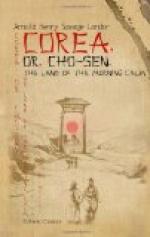Here let me digress. This ambassador’s funeral, was, indeed, a comical sight. I am well aware that it is bad form to find entertainment among things pertaining to the dead. However, it was not the corpse that made the performance in question seem funny, but those that remained alive, and intended to honour his remains. Telegrams arrived from Japan to the effect that the body should be despatched to his native country; arrangements were therefore made by the Japanese indwellers to convey and escort the body of their representative from the capital to Chemulpo, a port about twenty-five miles distant. According to this plan, the loyal Japanese coolies were to carry the heavy hearse on their backs, while the King of Corea agreed to despatch four hundred soldiers of cavalry and infantry by way of escort, all the foreign residents being also intended to follow the procession part of the way in their sedan-chairs. So far so good, and all proceeded, as directed, in good order until the Mafu ferry was reached. The procession, having crossed the river here, at once proceeded to re-form on the large stretch of sand on the other side. While, then, the Japanese, who have always been fond of playing at soldiers, and had brought down to the river-side with them a couple of field-guns, were being treated by a Japanese attache, clad in an exaggerated diplomatic uniform covered with gold braiding, and standing in dancing pumps in the sands that half-buried him, to a recapitulation of the virtues of the defunct, the coolies were bearing the hearse on their backs, the Corean cavalry and infantry forming two lines in good style. There stood the Corean horsemen, each supported by two men, apparently unconcerned at the long Japanese rigmarole, of which they did not understand a word; there rode as stiff as statues outside the ranks the officers of Cho-sen, on their little ponies. All of a sudden, however, the two field-guns went off, and with the most disastrous effects. Half the cavalrymen tumbled off their saddles at the unexpected bucking of their frightened ponies, and the whole band of horsemen was soon scattered in every direction, while the men who were carrying the hearse, following the example of the ponies, gave such a jerk at the sudden explosion, as to nearly drop their burden on the ground. By-and-by, the commotion subsided; the procession got into marching order, and all went well until the seaport was reached. The better class Japanese, I may mention, were dressed in stage uniforms, or in evening dress and tall hats, and that though the hour was 9 A.M. or soon after.
But let us return to the royal palace. The King and Queen have numberless relations, but not all of these live in the royal “compound.” Those that do, have each a separate small house; those that do not, live in the immediate neighbourhood of the palace enclosure, so as to be within easy reach when wanted; it being one of the little failings of the Corean potentate to call up his relations at all hours as well of the night as of the day. In fact, nearly all the work done by the King, and nearly all the interviews which he grants to his Ministers take place during the dark hours, the principal reason given for which is that by this means, intrigue is prevented, and people are kept in utter ignorance as to what takes place at Court.




